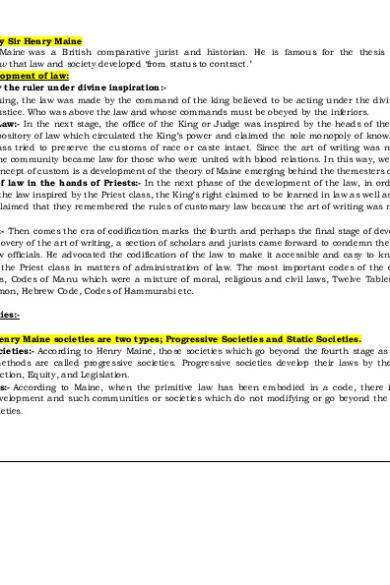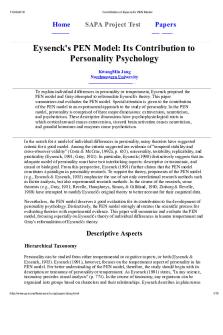Contribution Of Sir Henry Maine - Historical School of Law PDF

| Title | Contribution Of Sir Henry Maine - Historical School of Law |
|---|---|
| Author | Spectrum Esp |
| Course | Jurisprudence-1 |
| Institution | Chaudhary Charan Singh University |
| Pages | 1 |
| File Size | 67.4 KB |
| File Type | |
| Total Downloads | 62 |
| Total Views | 179 |
Summary
Contribution Of Sir Henry Maine - Historical School of LawContribution Of Sir Henry Maine - Historical School of Law...
Description
Contribution By Sir Henry Maine Sir Henry Maine was a British comparative jurist and historian. He is famous for the thesis outlined in his book Ancient Law that law and society developed ‘from status to contract.’ Stages of Development of law: 1. Law made by the ruler under divine inspiration:In the beginning, the law was made by the command of the king believed to be acting under the divine inspiration of Goddess of justice. Who was above the law and whose commands must be obeyed by the inferiors. 2. Customary Law:- In the next stage, the office of the King or Judge was inspired by the heads of the councils. Priest became a repository of law which circulated the King’s power and claimed the sole monopoly of knowledge. Therefore, the priest class tried to preserve the customs of race or caste intact. Since the art of writing was not invented, the customs of the community became law for those who were united with blood relations. In this way, we notice a special event. The concept of custom is a development of the theory of Maine emerging behind the themesters or judgments. 3. Knowledge of law in the hands of Priests:- In the next phase of the development of the law, in order to implement and execute the law inspired by the Priest class, the King’s right claimed to be learned in law as well as in religion. The priest class claimed that they remembered the rules of customary law because the art of writing was not developed till then. 4. Codification:- Then comes the era of codification marks the fourth and perhaps the final stage of development of law. With the discovery of the art of writing, a section of scholars and jurists came forward to condemn the authority of the priests as law officials. He advocated the codification of the law to make it accessible and easy to know. It broke the monopoly of the Priest class in matters of administration of law. The most important codes of the era were Rome’s Twelve Tables, Codes of Manu which were a mixture of moral, religious and civil laws, Twelve Tables in Rome, Attic Code of Solomon, Hebrew Code, Codes of Hammurabi etc. Types of Societies:According to Henry Maine societies are two types; Progressive Societies and Static Societies. Progressive Societies:- According to Henry Maine, those societies which go beyond the fourth stage as developing their laws, by new methods are called progressive societies. Progressive societies develop their laws by the three methods namely; Legal Fiction, Equity, and Legislation. Static Societies:- According to Maine, when the primitive law has been embodied in a code, there is an end to its spontaneous development and such communities or societies which do not modifying or go beyond the fourth stage are called static societies....
Similar Free PDFs

8. Historical-School-of-Thought
- 6 Pages

Evaluation of Henry Fayol
- 4 Pages

University of Southampton Law School EQU
- 112 Pages

Historical Development of Libraries
- 12 Pages

Historical background of Philippines
- 13 Pages

Historical school - Lecture notes 3
- 12 Pages

Historical content of Robinson
- 3 Pages

Contribution of Eysenck\'s PEN Model
- 15 Pages

History of School Counseling
- 8 Pages
Popular Institutions
- Tinajero National High School - Annex
- Politeknik Caltex Riau
- Yokohama City University
- SGT University
- University of Al-Qadisiyah
- Divine Word College of Vigan
- Techniek College Rotterdam
- Universidade de Santiago
- Universiti Teknologi MARA Cawangan Johor Kampus Pasir Gudang
- Poltekkes Kemenkes Yogyakarta
- Baguio City National High School
- Colegio san marcos
- preparatoria uno
- Centro de Bachillerato Tecnológico Industrial y de Servicios No. 107
- Dalian Maritime University
- Quang Trung Secondary School
- Colegio Tecnológico en Informática
- Corporación Regional de Educación Superior
- Grupo CEDVA
- Dar Al Uloom University
- Centro de Estudios Preuniversitarios de la Universidad Nacional de Ingeniería
- 上智大学
- Aakash International School, Nuna Majara
- San Felipe Neri Catholic School
- Kang Chiao International School - New Taipei City
- Misamis Occidental National High School
- Institución Educativa Escuela Normal Juan Ladrilleros
- Kolehiyo ng Pantukan
- Batanes State College
- Instituto Continental
- Sekolah Menengah Kejuruan Kesehatan Kaltara (Tarakan)
- Colegio de La Inmaculada Concepcion - Cebu






